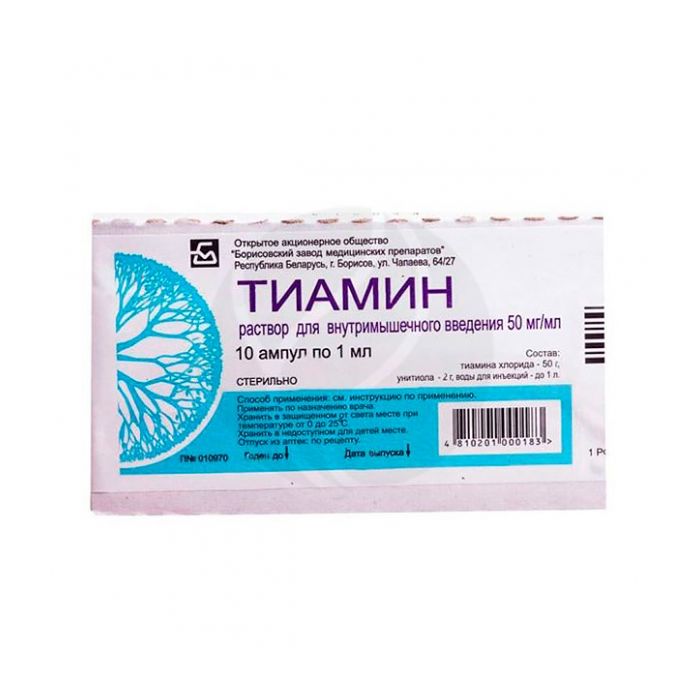Thiamin solution for injection 50mg / ml, 1ml No. 10
Expiration Date: 05/2027
Russian Pharmacy name:
Тиамин раствор для инъекций 50мг/мл, 1мл №10
Hypovitaminosis and vitamin B1 deficiency. Treatments for conditions associated with vitamin B1 deficiency:
- developing against the background of diabetes mellitus, alcoholism, treatment with antibiotics and chemotherapeutic agents that suppress the intestinal flora synthesizing B vitamins; with prolonged administration of hypertonic glucose solutions; in patients with renal pathology on hemodialysis, etc.;
- beriberi disease, pathology of the central (Wernicke encephalopathy) and peripheral nervous system (mono- and polyneuropathy, neuralgia, including herpes zoster, myalgia);
- pathology of the cardiovascular system;
- malabsorption syndrome of various origins, being on tube feeding. The dosage form 'solution for injection' is used in all clinical situations when it is necessary to quickly eliminate vitamin B1 deficiency and the impossibility of ingestion.
Intramuscularly (deep).
Adults are prescribed 25-50 mg of thiamine hydrochloride (0.5-1.0 ml) once a day, every day. The introduction is started with small doses - no more than 0.5 ml (25 mg) of the drug. With good tolerance, the dose is increased by 25 mg / day. The maximum daily dose is 300 mg / day.
The course of treatment is 10-30 injections.
Children: thiamine hydrochloride is prescribed at 12.5 - 25 mg once a day. Due to the complexity of dosing, instead of a solution of thiamine hydrochloride 50 mg / ml for the treatment of patients of this age group, it is recommended to use a solution of thiamine hydrochloride 25 mg / ml.
1 ampoule (1 ml) of the medicinal product contains:
active substance : thiamine hydrochloride - 50 mg,
excipients: unitiol, water for injection.
Hypersensitivity.
Composition:
1 ampoule (1 ml) of the medicinal product contains:
active substance: thiamine hydrochloride - 50 mg,
excipients: unitiol, water for injection.
pharmachologic effect
Thiamine plays an important role in the life of the body, is part of a number of enzymes and is involved in carbohydrate metabolism, in the processes of decarboxylation of a-keto acids and the synthesis of acetyl CoA. It has an effect on the conduction of nervous excitement in synapses, has ganglion-blocking and curariform properties. It is of great importance for the function of the nervous system, digestive apparatus, cardiac activity, and also the endocrine system. Foods serve as a source of thiamine for humans. In the absence or insufficient intake of it with food or under various conditions that impede its absorption and assimilation, a person develops the phenomena of hypo- and avitaminosis B1. The initial stages of vitamin B1 deficiency are characterized by nervous disorders (neurasthenia, headaches, migraines, fatigue, insomnia,pain and sensory disturbances in the extremities, muscle weakness, cramps in the calves), disorders of the cardiovascular system (shortness of breath, widening of the heart, disturbed rhythm) and digestive organs (anorexia, intestinal atony, constipation). Avitaminosis B1, called beriberi, proceeds either with paralysis and exhaustion, or with heart damage and edema. Thiamine taken orally is absorbed in the small intestine, partially undergoing inactivation by thiaminase.absorbed in the small intestine, partially undergoing inactivation by thiaminase.absorbed in the small intestine, partially undergoing inactivation by thiaminase.
Indications
Hypovitaminosis and vitamin B1 deficiency. Treatments for conditions associated with vitamin B1 deficiency:
- developing against the background of diabetes mellitus, alcoholism, treatment with antibiotics and chemotherapeutic agents that suppress the intestinal flora synthesizing B vitamins; with prolonged administration of hypertonic glucose solutions; in patients with renal pathology on hemodialysis, etc.;
- beriberi disease, pathology of the central (Wernicke encephalopathy) and peripheral nervous system (mono- and polyneuropathy, neuralgia, including herpes zoster, myalgia);
- pathology of the cardiovascular system;
- malabsorption syndrome of various origins, being on tube feeding. The dosage form 'solution for injection' is used in all clinical situations when it is necessary to quickly eliminate vitamin B1 deficiency and the impossibility of ingestion.
Contraindications
Hypersensitivity.
special instructions
Parenteral administration is recommended only if oral administration is not possible (nausea, vomiting, malabsorption syndrome, preoperative or postoperative conditions). In Wernicke's encephalopathy, the administration of dextrose should precede the administration of thiamine.
Method of administration and dosage
Intramuscularly (deep). Adults are prescribed 25-50 mg of thiamine hydrochloride (0.5-1.0 ml) once a day, every day. The introduction is started with small doses - no more than 0.5 ml (25 mg) of the drug. With good tolerance, the dose is increased by 25 mg / day. The maximum daily dose is 300 mg / day. The course of treatment is 10-30 injections.
Children: thiamine hydrochloride is prescribed at 12.5 - 25 mg once a day. Due to the complexity of dosing, instead of a solution of thiamine hydrochloride 50 mg / ml for the treatment of patients of this age group, it is recommended to use a solution of thiamine hydrochloride 25 mg / ml.
Side effects
Allergic reactions (urticaria, pruritus, Quincke's edema, rarely - anaphylactic shock), sweating, tachycardia. Rarely soreness (due to low pH solutions).
Drug interactions
The thiamine chloride solution should not be mixed with solutions containing sulfites, because in them it completely disintegrates. Simultaneous parenteral administration of thiamine with pyridoxine or cyanocobalamin is not recommended: pyridoxine makes it difficult to convert thiamine into a biologically active form, cyanocobalamin enhances the allergenic effect of thiamine. Thiamine and penicillin or streptomycin (destruction of antibiotics), thiamine and nicotinic acid (destruction of thiamine) should not be mixed in the same syringe. Weakens the effect of depolarizing muscle relaxants (suxamethonium iodide, etc.).
Overdose
In case of an overdose, the symptoms of side effects of the drug may increase. When used in large doses for a long time, signs of hyperthyroidism may appear: headache, agitation, tremor, increased heart rate, insomnia.
Treatment: stop taking the drug; treatment is symptomatic.
Storage conditions
Store in a dry place at a temperature not exceeding 25 ? C, out of the reach of children.
Shelf life is 3 years.

